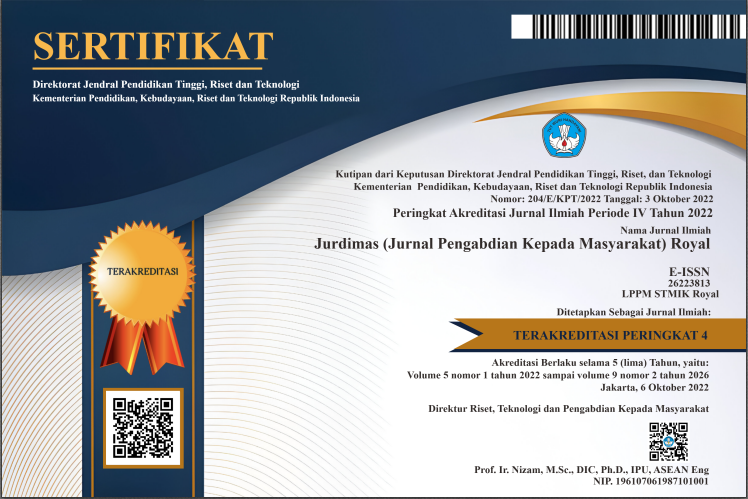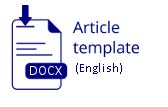Making Use of Flashcards In Teaching English Vocabulary In Southern Region of Sumatera
Abstract
Vocabulary mastery is essential to young learners in learning English. This activity of community service was aimed at utilizing flashcards in English vocabulary instruction. A convenient sample of thirteen participants, mostly females between the ages of thirteen and eighteen, was chosen for this current activity. This was carried out in one of orphanages in Palembang, South Sumatera. To monitor and evaluate the degree of vocabulary achievement of the EFL learners, a vocabulary test was administered both before and after the intervention. The results indicated that the t obtained was much higher than the set t table and p value earned was much lower than .05. Therefore, it could be concluded that using flashcards significantly accelerated the acquisition of English vocabulary by young learners. Lastly, some fruitful implication were directed to future facilitators, researchers, and young learners, as participants.
Keywords: flashcards; teaching; English vocabulary; young learners
Abstrak: Penguasaan kosakata sangat penting bagi pelajar muda dalam mempelajari bahasa Inggris. Kegiatan pengabdian masyarakat ini ditujukan untuk memanfaatkan kartu flash dalam pengajaran kosakata bahasa Inggris. Sampel yang terdiri dari tiga belas peserta, sebagian besar perempuan berusia antara tiga belas dan delapan belas tahun, dipilih untuk kegiatan saat ini. Kegiatan ini dilaksanakan di salah satu panti asuhan di Palembang, Sumatera Selatan. Untuk memantau dan mengevaluasi tingkat pencapaian kosakata pelajar EFL, tes kosakata diberikan sebelum dan sesudah intervensi. Hasilnya menunjukkan bahwa nilai t yang diperoleh jauh lebih tinggi daripada t tabel yang ditetapkan dan nilai p yang diperoleh jauh lebih rendah dari .05. Oleh karena itu, dapat disimpulkan bahwa penggunaan kartu flash secara signifikan mempercepat perolehan kosakata bahasa Inggris oleh pelajar muda. Terakhir, beberapa implikasi yang bermanfaat ditujukan di masa mendatang kepada fasilitator, peneliti, dan pelajar muda, sebagai peserta.
Kata kunci: kartu flash; pengajaran; kosakata bahasa Inggris; pelajar muda
References
Amiruddin., & Razaq, Y. (2022). The use of flashcards to improve students’ vocabulary achieve¬ment. Indonesian Journal of Research and Educational Review, 2(1), 145-151. https://doi.org/10.51574/ijrer.v1i2.332
Atmaja, A. S. K., Sonia, G. (2020). Using flash cards to improve students’ vocabulary. PROJECT (Professional Journal of English Education). 3(2), 283-289. https://doi.org/10.22460/project.v3i2
Chen, R. W., & Chan, K. K. (2019). Using augmented reality flashcards to learn vocabulary in early childhood education. Journal of Educational Computing Research, 57(7), 1812-1831. https://doi.org/10.1177/0735633119854028
Kusumawardhani, P. (2019) The Use of flashcards for teaching writing to English Young Learners (EYL). UNINDIRA: Journal of English Language Teaching , 4(1). 35-52. http://dx.doi.org/10.30998/scope.v4i01.4519
Li, J.-T., & Tong, F. (2019). Multimedia-assisted self-learning materials: The benefits of E-flashcards for vocabulary learning in Chinese as a Foreign Language. Reading and Writing: An Interdisciplinary Journal, 32(5), 1175-1195. https://doi.org/10.1007/s11145-018-9906-x
Mutholib, A., Munjiah, M., & Muflichah, S. (2020). The use of android-based dictionary game for Arabic vocabulary learning in elementary school. Proceedings of the 2nd International Conference on Quran and Hadith Studies Information Technology and Media in Conjunction with the 1st International Conference on Islam, Science and Technology, ICONQUHAS & ICONIST, Bandung, October 2-4, 2018, Indonesia.
Nation, P. (2019). The different aspects of vocabulary knowledge. The Routledge handbook of vocabulary studies (pp. 15-29): Routledge.
Ngarofah, S., & Sumarni, A. (2019). Teaching vocabulary using flashcard to young learner. PROJECT (Professional Journal of English Education), 1(6), 775-782. https://doi.org/10.22460/project.v1i6.p775-782
Pasaribu, S. P. Y., Hutasoit, R. D., & Sihombing, Y. N. (2022). Enhancing student’s vocabulary by using flashcard media via google classroom during Covid-19. Edukatif: Jurnal Ilmu Pendidikan, 4(1), 227-232. 10.31004/edukatif.v4i1.1808
Petina, F., Irdiyansyah, I., & Suryanti, Y. (2023). The implementation of instructional media in teaching English to Young Learners. Journal of English Language Studies Volume, 5(1). https://doi.org/10.55215/jetli.v5i1.7144
Rahmawati, F., Rahman, A., & Usman, U. (2021). the effect of world cafe learning method on students’ oral communication competence in Biology learning. Gagasan Pendidikan Indonesia, 2(1), 48-59. http://dx.doi.org/10.30870/gpi.v2i1.10888
Supriatin, T., & Rizkilillah, V. P. (2018). Teaching vocabulary using flashcard. PROJECT (Professional Journal of English Education), 1(4), 479-485. 10.22460/project.v1i4.p479-485
Vu, D. V., & Peters, E. (2021). Vocabulary in English language learning, teaching, and testing in Vietnam: A review. Education Sciences, 11(9), 563. 10.3390/educsci11090563
Wong, K. M., Flynn, R. M., & Neuman, S. B. (2021). L2 vocabulary learning from educational media: The influence of screenâ€based scaffolds on the incidental–intentional continuum. TESOL Journal, 12(4), 1-20. https://doi.org/10.1002/tesj.641
Wright, T. S., Cervetti, G. N., Wise, C., & McClung, N. A. (2021). The impact of knowledge-building through conceptually-coherent read alouds on vocabulary and comprehension. Reading Psychology, 43(2), 1-15. 10.1080/02702711.2021.2020187
Yüksel, H. G., Mercanoğlu, H. G., & Yılmaz, M. B. (2020). Digital flashcards vs. wordlists for learning technical vocabulary. Computer Assisted Language Learning, 35(3) 1-17. 10.1080/09588221.2020.1854312
Zulkarnain, I., Lubis, S.I. & Harahap, J. (2022). The effect of text twist game on students’ vocabulary mastery at MAS Muhammadiyah 13 Sei Rampah. Pedagogi, 8(1), 57–62.














